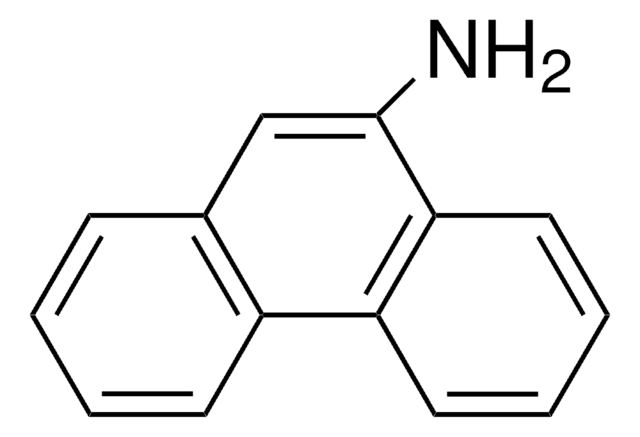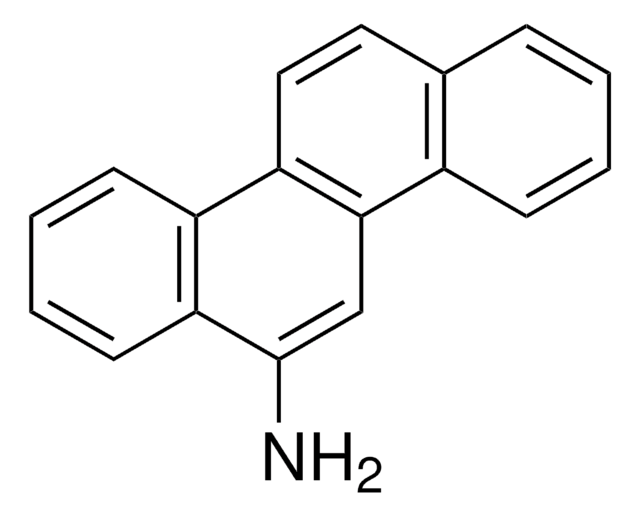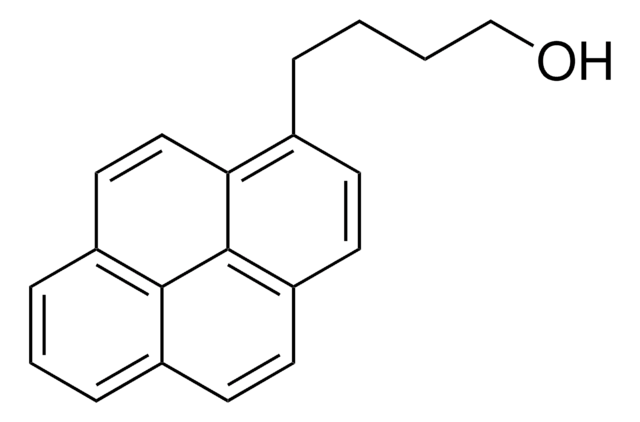A77903
1-Aminopyrene
97%
Sinónimos:
1-Pyrenamine, 3-Aminopyrene
Iniciar sesiónpara Ver la Fijación de precios por contrato y de la organización
About This Item
Fórmula empírica (notación de Hill):
C16H11N
Número de CAS:
Peso molecular:
217.27
Beilstein/REAXYS Number:
1875737
EC Number:
MDL number:
UNSPSC Code:
12352100
PubChem Substance ID:
NACRES:
NA.22
form:
powder
assay:
97%
Productos recomendados
Quality Level
assay
97%
form
powder
mp
115-117 °C (lit.)
SMILES string
Nc1ccc2ccc3cccc4ccc1c2c34
InChI
1S/C16H11N/c17-14-9-7-12-5-4-10-2-1-3-11-6-8-13(14)16(12)15(10)11/h1-9H,17H2
InChI key
YZVWKHVRBDQPMQ-UHFFFAOYSA-N
¿Está buscando productos similares? Visita Guía de comparación de productos
Categorías relacionadas
Application
- Synthesis and evaluation of aromatic stationary phases based on linear solvation energy relationship model for expanded application in supercritical fluid chromatography.: Explores the use of 1-Aminopyrene in the development of advanced stationary phases for chromatography, enhancing the efficiency and application range in pharmaceutical and environmental analysis (Ge et al., 2024).
- Two-Dimensional Porphyrinic Metal-Organic Framework Composites as a Photocatalytic Platform for Chemoselective Hydrogenation.: Highlights the integration of 1-Aminopyrene into metal-organic frameworks, providing a new avenue for creating highly efficient photocatalytic systems for organic synthesis, relevant to both academic research and industrial chemical manufacturing (Dong et al., 2023).
- Exploiting and Engineering Neuroglobin for Catalyzing Carbene N-H Insertions and the Formation of Quinoxalinones.: Discusses the role of 1-Aminopyrene in enhancing enzymatic reactions within engineered proteins, paving the way for novel synthetic pathways in pharmaceutical research (Sun et al., 2023).
signalword
Warning
hcodes
Hazard Classifications
Acute Tox. 4 Oral
Storage Class
11 - Combustible Solids
wgk_germany
WGK 1
flash_point_f
Not applicable
flash_point_c
Not applicable
ppe
dust mask type N95 (US), Eyeshields, Gloves
Elija entre una de las versiones más recientes:
¿Ya tiene este producto?
Encuentre la documentación para los productos que ha comprado recientemente en la Biblioteca de documentos.
Los clientes también vieron
Dina Mukha et al.
ChemSusChem, 13(10), 2684-2692 (2020-02-19)
The construction of bias- and donor-free photobioelectrochemical cells for the generation of light-triggered electrical power is presented. The developed oxygen reduction biocathodes are based on bilirubin oxidase (BOD) that originates from Myrothecium verrucaria (MvBOD) and a thermophilic Bacillus pumilus (BpBOD).
Tianzhu Zhou et al.
Nature communications, 11(1), 2077-2077 (2020-05-01)
Flexible reduced graphene oxide (rGO) sheets are being considered for applications in portable electrical devices and flexible energy storage systems. However, the poor mechanical properties and electrical conductivities of rGO sheets are limiting factors for the development of such devices.
R Shapiro et al.
Chemical research in toxicology, 11(4), 335-341 (1998-05-05)
While the one-ring amine aniline (AN) has only slight genetic activity, the polycyclic aromatic amines 2-aminofluorene (AF) and 1-aminopyrene (AP) are significant mutagens and carcinogens. Moreover, the bulkier AP is more mutagenic per adduct than AF in the tetracycline-resistance gene
O Wongwattanasathien et al.
Food and chemical toxicology : an international journal published for the British Industrial Biological Research Association, 48(4), 1045-1051 (2010-01-27)
The mutagenicity of dichloromethane, methanol and water extracts of Antigonon leptopus Hook. & Arn., Curcuma sessilis Gage, Hibiscus rosa-sinensis Linn., Ixora coccinea Linn., Millingtonia hortensis Linn., Nelumbo nucifera Gaertn., Plumeria obtusa Linn., Punica granatum Linn., Rhinacanthus nasutus ((Linn.) Kurz.) and
Susan Huyck et al.
Journal of exposure science & environmental epidemiology, 20(7), 650-655 (2010-05-06)
Biomonitoring of exposures to toxins is an important tool for monitoring public health and safety. Using this tool, exposures are typically measured by the collection of biological specimens such as blood and urine samples. Urine sampling represents a more convenient
Nuestro equipo de científicos tiene experiencia en todas las áreas de investigación: Ciencias de la vida, Ciencia de los materiales, Síntesis química, Cromatografía, Analítica y muchas otras.
Póngase en contacto con el Servicio técnico













